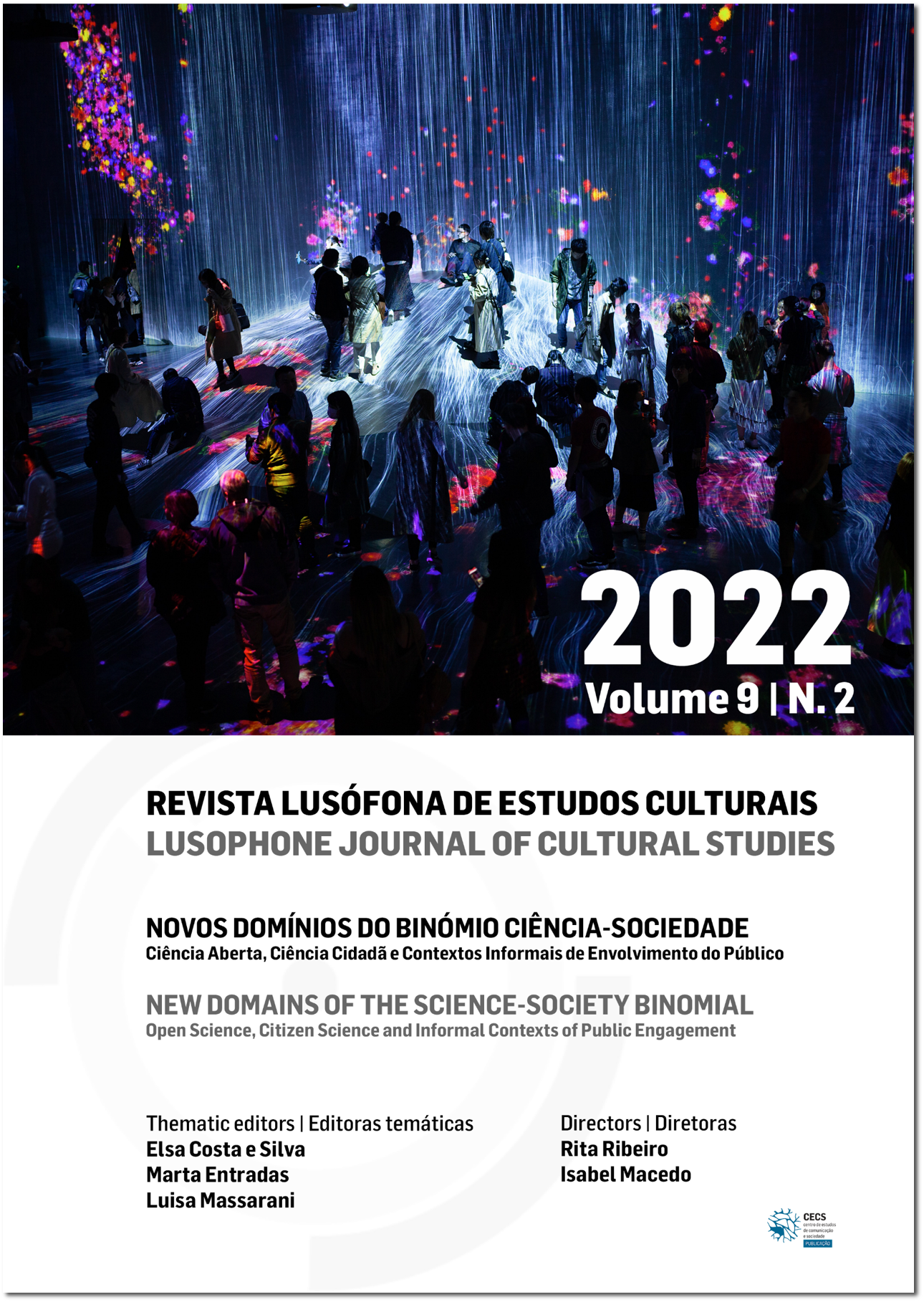Bottom-Up and Reciprocal Citizen Science: Untapped Resources of Novel Ideas. Preliminary Experiences of a Citizen Science As Public Engagement Program
DOI:
https://doi.org/10.21814/rlec.3996Keywords:
citizen science, mentoring, bottom-up citizen science, empowermentAbstract
In scientific research, citizen science is widely regarded as an involvement of the general public in scientific research initiated by universities, scientific organisations or research centres. In this top-down approach (top-down citizen science), participating citizens usually collect data or provide samples for research — that is, they are considered volunteer research assistants following instructions. This study analyses alternatives of top-down citizen science: one, widely known, which is the bottom-up way of citizen science and another, the reciprocal approach suggested by the authors. Bottom-up is based on local initiatives and is constituted by community-led projects. For bottom-up citizen science, scientific organisations may provide methodological and organisational frames. However, the idea and the implementation remain in the competence of the participant citizens. Reciprocal citizen science emerged from a need for a more holistic policy toward citizen science. As part of this, identifying viable citizen-initiated projects, measuring their scientific and/or innovation potential, and integrating them into a citizen science mentor program are questions to be systematically discussed and solved. This study addresses methodological challenges in mentoring citizen science projects, covering a mentor training concept for citizen science designed by the Institute of Transdisciplinary Discoveries. Encouraging citizen research is needed for a new impetus to scientific discoveries. The perspectives of people with no scientific background can also advance problems — mainly those that require fresh and unbiased approaches. Citizen science may also be a solution for leveraging the knowledge of science leavers.
Downloads
References
Bonney, R., Cooper, C. B., Dickinson, J., Kelling, S., Phillips, T., Rosenberg, K., & Shirk, J. (2009). Citizen science: A developing tool for expanding science knowledge and scientific literacy. BioScience, 59(11), 977–984. https://doi.org/10.1525/bio.2009.59.11.9
Clary, E. G., Snyder, M., Ridge, R. D., Copeland, J., Stukas, A. A., Haugen, J., & Miene, P. (1998). Understanding and assessing the motivations of volunteers: A functional approach. Journal of Personality and Social Psychology, 74(6), 1516–1530. https://doi.org/10.1037//0022-3514.74.6.1516
Cohen, J. B. (1920). The scientific citizen. Athenaeum, 1830.
Eicken, H., Danielsen, F., Sam, J.-M., Fidel, M., Johnson, N., Poulsen, M. K., Lee, O. A., Spellman, K. V., Iversen, L., Pulsifer, P., & Enghoff, M. (2021). Connecting top-down and bottom-up approaches in environmental observing. BioScience, 71(5), 467–483. https://doi.org/10.1093/biosci/biab018
Eurostat. (2018, April 4). Work beats study for 25% of university dropouts. https://ec.europa.eu/eurostat/web/products-eurostat-news/-/DDN-20180404-1
Follett, R., & Strezov, V. (2015). An analysis of citizen science-based research: Usage and publication patterns. PLoS ONE, 10(11), Article e0143687. https://doi.org/10.1371/journal.pone.0143687
Gewin, V. (2020). Ways to look after yourself and others in 2021. Nature, 588, 717–718. https://doi.org/10.1038/d41586-020-03558-w
Goddard, J., Hazelkorn, E., Kempton, L., & Vallance, P. (2016). The civic university. The policy and leadership challenges. Edward Elgar Publishing.
Haklay, M. (2013). Citizen science and volunteered geographic information: Overview and typology of participation. In S. Sui, S. Elwood, & M. Goodchild (Eds.), Crowdsourcing geographic knowledge (pp. 105–122). Springer. https://doi.org/10.1007/978-94-007-4587-2_7
Haklay, M. (2014, September 10). Citizen science in Oxford English Dictionary. Po Ve Sham – Muki Haklay’s personal blog. https://povesham.wordpress.com/2014/09/10/citizen-science-in-oxford-english-dictionary/
Haklay, M., Dörler, D., Heigl, F., Manzoni, M., Hecker, S., & Vohland, K. (2021). What is citizen science? The challenges of definition. In K. Vohland, A. Land-Zandstra, L. Ceccaroni, R. Lemmens, J. Perelló, M. Ponti, R. Samson, & K. Wagenknecht (Eds.), The science of citizen science (pp. 13–35). Springer. https://doi.org/10.1007/978-3-030-58278-4_2
Jármai, E. M. (2018). Menedzserszerep-kihívások a felsőoktatásban – Az oktatói munka (de)motiváló tényezői. Taylor, 10(1), 115–129. https://ojs.bibl.u-szeged.hu/index.php/taylor/article/view/13153
Magnussen, R. (2017). Involving lay people in research and professional development through gaming: A systematic mapping review. In Proceedings of 11th European Conference on Games Based Learning (ECGBL 2017) (pp. 394–401). Publisher Academic Conferences and Publishing International.
Maslach, C., & Jackson, S. E. (1982). Burnout in health professions. A social psychological analysis. In G. S. Sanders & J. Suls (Eds.), Social psychology of health and illness (pp. 227–247). Psychology Press.
Ostermann-Miyashita, E., Nadja, P., & König, H. (2021). Citizen science as a bottom-up approach to address human-wildlife conflicts: From theories and methods to practical implications. Conservation Science and Practice, 3, Article 385. https://doi.org/10.1111/csp2.385
Parthenos. (2019, February 11). Citizen science in the (digital) arts and humanities. https://training.parthenos-project.eu/sample-page/citizen-science-in-the-digital-arts-and-humanities/
Sík, A., Bogdan, C., & Hargitai, E. (2021, September 13–17). Transdisciplinary mentoring of bottom-up citizen science projects [Conference presentation]. International Transdisciplinarity Conference, Zurich, Switzerland.
Site, L. (2017). Commentary: Surviving scientist burnout. Physics Today, 70(9), 10–11. https://doi.org/10.1063/PT.3.3675
Somerwill, L., & Wehn, U. (2022) How to measure the impact of citizen science on environmental attitudes, behaviour and knowledge? A review of state-of-the-art approaches. Environmental Sciences Europe, 34, Article 18. https://doi.org/10.1186/s12302-022-00596-1
UNESCO Institute for Statistics. (2019, June). Women in science. Fact Sheet, (55). http://uis.unesco.org/sites/default/files/documents/fs55-women-in-science-2019-en.pdf
UNESCO Recommendation on Open Science, November 2021, https://unesdoc.unesco.org/ark:/48223/pf0000379949.locale=en
Vohland K., Göbel, C., Balázs, B., Butkevičienė, E., Daskolia, M., Duží, B., Hecker, S., Manzoni, M., & Schade, S. (2021). Citizen science in Europe. In K. Vohland, A. Land-Zandstra, L. Ceccaroni, R. Lemmens, J. Perelló, M. Ponti, R. Samson, & K. Wagenknecht (Eds.), The science of citizen science (pp. 35–53). Springer. https://doi.org/10.1007/978-3-030-58278-4_3
Vohland, K., Land-Zandstra, A., Ceccaroni, L., Lemmens, R., Perelló, J., Ponti, M., Samson, R. & Wagenknecht, R. (2021). Editorial: The science of citizen science evolves. In K. Vohland, A. Land-Zandstra, L. Ceccaroni, R. Lemmens, J. Perelló, M. Ponti, R. Samson, & K. Wagenknecht (Eds.), The science of citizen science (pp. 1–12). Springer. https://doi.org/10.1007/978-3-030-58278-4_1
World Economic Forum. (2020, October). Future of jobs report 2020. https://www3.weforum.org/docs/WEF_Future_of_Jobs_2020.pdf
Downloads
Published
How to Cite
Issue
Section
License
Copyright (c) 2022 Evelin Gabriella Hargitai, Attila Sik, Alexandra Samoczi , Milan Hathazi

This work is licensed under a Creative Commons Attribution 4.0 International License.
Authors own the copyright, providing the journal with the right of first publication. The work is licensed under a Creative Commons - Atribuição 4.0 Internacional License.








